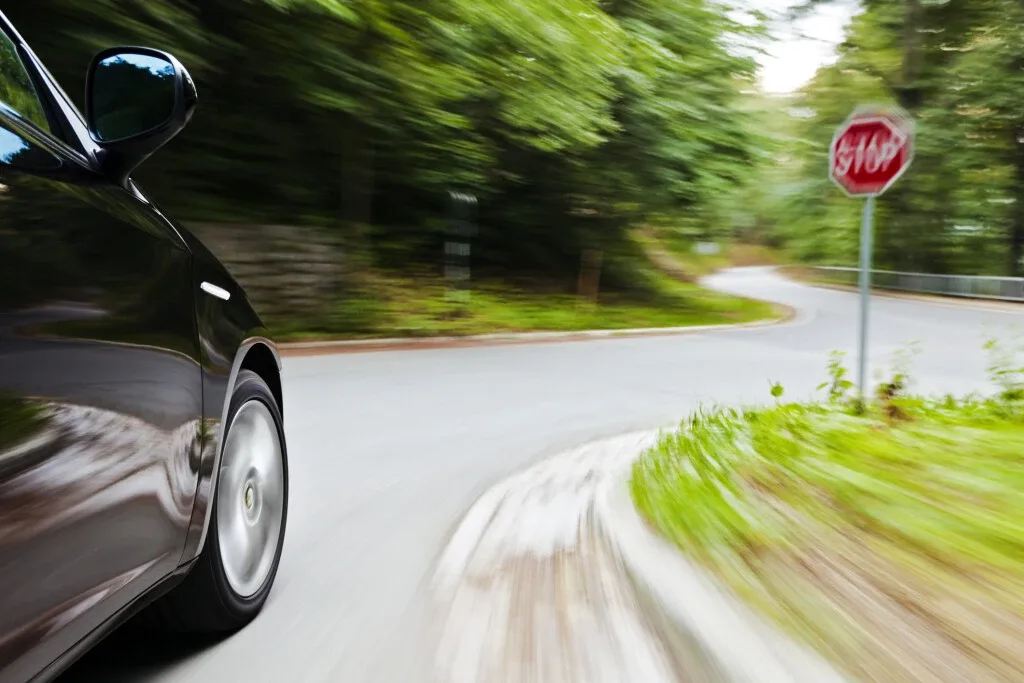In California, Vehicle Code 23103 VC defines reckless driving as:
“A person who operates a motor vehicle with a willful or wanton disregard for the safety of other people or property.”
In other words – the individual driving recklessly was aware that their actions could potentially cause substantial risks and still chose to ignore them – even if they didn’t intend to cause injury or harm.
Reckless vs. Aggressive Driving
The primary difference between reckless driving and aggressive driving is that victims hit by a reckless driver often suffer serious injuries after their car accident.
Reckless driving requires engaging in unsafe behavior, while aggressive driving requires unsafe behavior along with the intent to harm other drivers, or also commonly referred to as “road rage”.
Aggressive driving can involve behaviors intended to harass, intimidate, injure, or obstruct other drivers, including:
- Ignoring traffic signs or signals
- Driving on the wrong side of the road or outside designated lanes
- Improper passing
- Failure to yield
- Tailgating
- Stopping on a highway
While many states have separate statutes for aggressive driving and reckless driving – California does not, as there’s no legal distinction between the two.
Both reckless driving and aggressive driving are treated as criminal offenses and are typically considered and charged as misdemeanors.
What Behaviors Constitute Reckless Driving?
Reckless driving is a serious offense in California and can result in dire legal consequences.
The most common behaviors that constitute reckless driving in California include:
- speeding, racing, weaving in and out of traffic
- tailgating, running red lights or stop signs
- failing to yield the right of way
- running red lights or stop signs
Other common behaviors that constitute reckless driving include:
- failing to yield the right of way to other drivers
- distracted driving, such as texting while driving
- impaired driving, such as driving under the influence of drugs or alcohol
- excessive horn honking or making rude gestures at other drivers
If convicted of reckless driving, a driver may face fines, jail time, license suspension or revocation, community service, or points on their license. It’s essential for all drivers to be aware of the behaviors that constitute reckless driving in California so they can avoid them and keep the roads safe for others.
What Speed is Considered Reckless Driving?
In California, reckless driving is any speed that is 15 mph over the legal limit.
California’s absolute speed limits prohibit driving faster than:
- 70 mph on freeways posted for that speed
- 65 mph on freeways and other highways
- 55 mph on two-lane, undivided highways (unless posted for a higher speed).
Anyone who drives faster than these speed limits are violating state law.
California also prohibits driving faster than is safe for normal conditions – this means that regardless of the speed limit posted, speeding can be considered on other factors such as the presence of pedestrians, other vehicles, as well as road and weather conditions.
Consequences for Reckless Driving
In California, the consequences and punishment for reckless driving depends on the driver’s actions and severity of the injuries they caused.
Reckless driving penalties may include:
- Monetary fines
- Jail or probation time
- Driver’s license suspension or revocation
- Increases auto insurance premiums
If no one is injured as a consequence of reckless driving other than the driver, they can expect the following punishment:
- 5 – 90 days of jail time
- $145 – $1,000 in fines
However, if reckless driving causes an injury to someone else, consequences become more severe:
- Imprisonment in a county jail or state prison for 30 days to 6 months
- A fine between $220 and $1,000.
Driving in a way that’s likely to cause injury to others can also result in charges of assault with a deadly weapon, which carries two to four years in prison.
Alcohol-related reckless driving can result in an additional one to two years of probation, as well as mandatory treatment programs.
If reckless driving is charged as a felony, penalties can include:
- Imprisonment in a county jail or state prison up to 3 years
- Fines up to $10,000
If the jury finds that the driver is considered risky, the judge may decide to suspend their driver’s license for the following periods of time:
- Up to 30 days upon first conviction of reckless driving
- Up to 60 days upon second conviction
- Up to 6 months upon third or any subsequent convictions
- License revoked for 6 months to life if they have three cases of reckless driving within one year.
- License revoked for at least 3 years if they kill someone as a result of reckless driving
The California Department of Motor Vehicles (DMV) may also add two points to the driver’s license for reckless driving, which may count as a conviction against them in future license suspension or other legal proceedings.
The reckless driver’s auto insurance premiums may significantly increase as a result of their conviction depending on their individual risk to others. In some cases, their insurance company may decide to drop the insurance coverage altogether.
West Coast Trial Lawyers Can Help You With Your Car Accident Case
Have you or someone you love been injured in an accident caused by someone’s reckless driving? Victims who were injured in a car accident caused by an aggressive driver may be eligible to file a personal injury claim for damages.
If you’ve been injured as a result of someone’s aggressive driving, you have the legal right to hold them responsible for their actions and in recovering your losses. Our qualified car accident attorneys can help you get the justice and compensation you deserve.
To schedule a free consultation with our dedicated personal injury lawyers at West Coast Trial Lawyers, please don’t hesitate to contact our legal team by phone at 888-585-2793 or email at [email protected].








